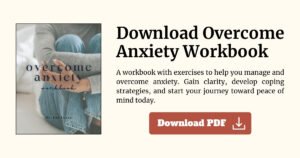Benefitting from the Zeigarnik Effect Through Life Coach Training
 I remember how hard and long it took me to move on from a breakup that came out of nowhere— one that was so unclear and sounded like something full of lies. Months after, I continued to question everything about myself and everything… the situation was like an extensive phase of denial and I didn’t know how to find resolve.
I remember how hard and long it took me to move on from a breakup that came out of nowhere— one that was so unclear and sounded like something full of lies. Months after, I continued to question everything about myself and everything… the situation was like an extensive phase of denial and I didn’t know how to find resolve.
Was I not enough?
Was there really nothing that could have fixed it?
The Zeigarnik Effect can be simply explained as the nagging and pestering thoughts that come when you have been in a situation without resolution. I took a coaching certificate course to help me move on from that breakup— it unexpectedly gave me the closure I needed.
Before you continue you might like to consider our free worksheet on exploring “Overcome Anxiety”. Please download this worksheet here.
Zeigarnik Effect in Psychology: The Mental Phenomenon Behind Unfinished Business
The Zeigarnik Effect is a psychological concept that explains why our minds are wired to remember unfinished tasks better than completed ones. This effect was first observed by Lithuanian psychologist Bluma Zeigarnik in the 1920s, and it reveals how unresolved situations or unfinished business create a persistent mental tension, which our brains cannot easily forget until the task is completed or resolved.
ORIGIN AND EXPERIMENTS.
This phenomenon was first observed by a Lithuanian psychologist named Bluma Zeigarnik when she was at a café with Kurt Lewin, her professor. She noticed how seemingly easy the waiters were able to remember the long complex orders of customers as they are takin git and as it is being processed in the kitchen, but somehow effortlessly forgets it right after it is done and is to be served and delivered to a table or when the customer is done paying for it. This led to her hypothesis that uncompleted tasks linger in our memory longer than tasks that are done and finished. In an experiment that she did in 1927, (which she then published on “On Finished and Unfinished Tasks”), she asked each participant to finish a sequence of individuals tasks, like solving a puzzle, box assembly, etc. During the first half of the series of tasks, the partakers were slightly interrupted; and in the second half, they were not disturbed and as they were finishing it. Zeigarnik examined their memory recall and found how the interrupted tasks were remembered more than the completed tasks. In a related experiment, the participants were able to bring to mind incomplete errands 90% better than completed tasks. Other experiments done to confirm her showed that differences in motivation are also involved in task completion. It was found that those with higher motivation to accomplish tasks are more affected by tasks that they have not completed and would be more likely to remember them. By contrast, if one is less motivated, the incomplete status of a task be would be of less concern and so less memorable to them.
The Cognitive Mechanism Behind the Zeigarnik Effect
The mental discomfort caused by the Zeigarnik Effect arises because the brain perceives unfinished tasks as unresolved problems that need attention. This tension makes us continually revisit incomplete tasks, often distracting us from other important areas of life. This is why it’s so common to find ourselves obsessing over unresolved emotional issues, work deadlines, or personal goals we haven’t yet achieved.
IN ANXIETY.
That “mind-nagging” phenomenon of the Zeigarnik effect can affect one’s mental health. When thinking about unfinished tasks, mostly those with negative possibilities, often causes recurrent and worrying disturbing thoughts. These thoughts can impair sleep, promote anxiety, which then further drains a person’s mental and emotional capacities, which can result in unhealthy tendencies and behaviors. Before I took a life coach certification, I was losing sleep, even doing unproductive and unnecessary tasks just to help me exhaust my body and brain to help me doze. I was always on edge and nervous, I did not eat and drink well, I lost weight unhealthily. This continued for months as I kept ruminating about how I felt inadequate, insufficient, and easily replaced loops” occupy much of your cognitive effort and debilitate your attention, causing anxiety, sapping your energy, and draining your willpower.
 IN PROCRASTINATION.
IN PROCRASTINATION.
As my mind was preoccupied with thoughts of incompetence, it has brought me to a state of endless deferment. I was always behind my school readings, I kept putting off great opportunities for career growth. When your mind knows that you’ve got things to take care of, it keeps revisiting that thought. Like how having no closure got me into a continuous seeking for validation. I wanted to answer if my questions: was I wrong about myself or I did deserve what happened?
When I finally decided to seek answers, what I learned about myself was quite unexpected.
How Life Coach Training Transformed Me
We now go back to the confirmatory findings of Atkinson that was mention earlier in this article:
“… those with higher motivation to accomplish tasks are more affected by tasks that they have not completed and would be more likely to remember them. By contrast, if one is less motivated, the incomplete status of a task be would be of less concern and so less memorable to them.”
My life coach training helped me realize that I was so motivated (high motivation) to find validation of my worth from my partner (task), the breakup curtailed my pursuit of that justification (state of incompletion)
I was trapped in thoughts of inadequacy, I kept remembering that I couldn’t find that validation. And boy was I wrong!
I WAS WRONG because I was focused on seeking support for my esteem from others— I was wrong to put that sense of responsibility to others. My training taught me that I am accountable for myself, I should be in charge of fulfilling my needs by looking first at what I have. I am my liability,
I kept myself from progress because I was not looking at the bigger picture of how I should be answerable to myself. I was months behind taking a step towards growth because I didn’t want to abandon the thought that I need others for validation.
I looked into myself with a new sense as I was taking the course. I started to plot my specific goals and took actions that are parallel to its achievement. I looked at the things I have that I could use, and the things I still need to improve to reach my ambition.
I invested my motivation in my goal of being able to participate in an art exhibit. I found a mentor, diversified my connections, attended workshops, explored mediums and styles, and practiced now and then. I reached my goal in the second year of my pursuit.
I used the “mind-nagging” feature of the Zeigarnik effect to keep me focused and reminded about my goal. It took me a while but the ‘pestering and constant” reminder of the things I need to prepare and experience to achieve my dream kept my eyes on the prize. I kept taking steps to reach my objective.
Away from Nagging Tasks: How to Stop the Anxiety
Whenever the Zeigarnik effect takes a toll on you to bring anxiety, I learned from coaching that you can try the following to help you through this:
 As a probable cause for anxiety would be unfinished business/unfinished tasks or deep unresolved issues from your past, try to identify them, list them down. Sometimes these unresolved issues go way back, go include it. Break them down into little parts that you can resolve.
As a probable cause for anxiety would be unfinished business/unfinished tasks or deep unresolved issues from your past, try to identify them, list them down. Sometimes these unresolved issues go way back, go include it. Break them down into little parts that you can resolve.- This mental nagging can make one focus on the bad rather than look at the other good things that have happened, so try to be grateful. Practice kindness and gratitude.
- You ruminate about imaginary scenarios that have not happened yet (which causes worry or overthinking), looking too far into the future of a fabricated situation makes your mind label it as an “unfinished task”. You can try focusing on the present ( you can try practicing mindfulness), what you can do now to prevent or bring to fruition the future that you want.
- Finding closure. Anxiety-inducing memories like trauma or abuse keep coming into mind is the way that your brain tries to make sense of things. Forgiving is a big factor. It brings you to an awareness and understanding that you were not the one with the issue, but they were, or that maybe it’s the both of you. Forgive them and yourself and move forward.
Preventing Procrastination
 Now, this brings us to practice goal-setting which you can ask your coach about or you can learn from life coach training.
Now, this brings us to practice goal-setting which you can ask your coach about or you can learn from life coach training.
The Zeigarnik effect as shown in Masicampo’s experiment showed that a specific plan execution of goals frees up the mental strain and that energy is allocated for other cognitive undertakings.
Those who simply thought about it as a daunting task (the second group, because they were not prepared for an exam right after the first task) without developing a means of undertaking it were subliminally controlled by the effects of procrastination.
His findings advocate that careful planning can liberate us from the persistent mental nagging associated with procrastination. Outlining how to complete a task before actually completing it, allows us to focus more on other things.
Now it is called practical goal setting for a reason that the outlining of goals does not have to daunting that you have to meticulously and fervently stick on it step-by-step. You have to be practical, use a realistic but bigger perspective in ticking out tasks on your list.
3 Hacks to Beat the Zeigarnik Effect
To sum up, the ways to use this phenomenon to your advantage, the following are the three hacks that you may use or share with others.
- Stop Saying “Tomorrow”. Act immediately, do it now. A task that if it can be completed in less than two minutes should be done to prevent it from adding up to your to-do list.
- Plan, Plan, Plan. When you suddenly come with a thought of a goal and invest a minute or minutes to plan and record how to achieve it. You can write an essay, an outline; or a list of contents.
- Be Practical with your List. You don’t have to be too uptight sticking up with your list, this list should be a guide and not something that should nag you into anxiety. Break it down to smaller and easily achievable tasks so you can track and see your progress.
The Zeigarnik Effect explained the unhealthiness of my thoughts before I got my coaching certificate. But for sure, it has also helped me find the closure I long wanted— a closure that involved practicing kindness, gratitude, mindfulness, planning, and forgiveness. The best closure I ever had and what might be the best closure you’d ever need, will be a closure that doesn’t need to come from another person, it should come within yourself. You can comment down below, I would love to hear your own experiences related to the Zeiganik Effect— I’m all open to your story of moving on too!
Ready to break free from anxiety and procrastination? Download our free worksheet to explore how you can leverage practical goal-setting and mindfulness to overcome the Zeigarnik Effect and achieve lasting closure.






